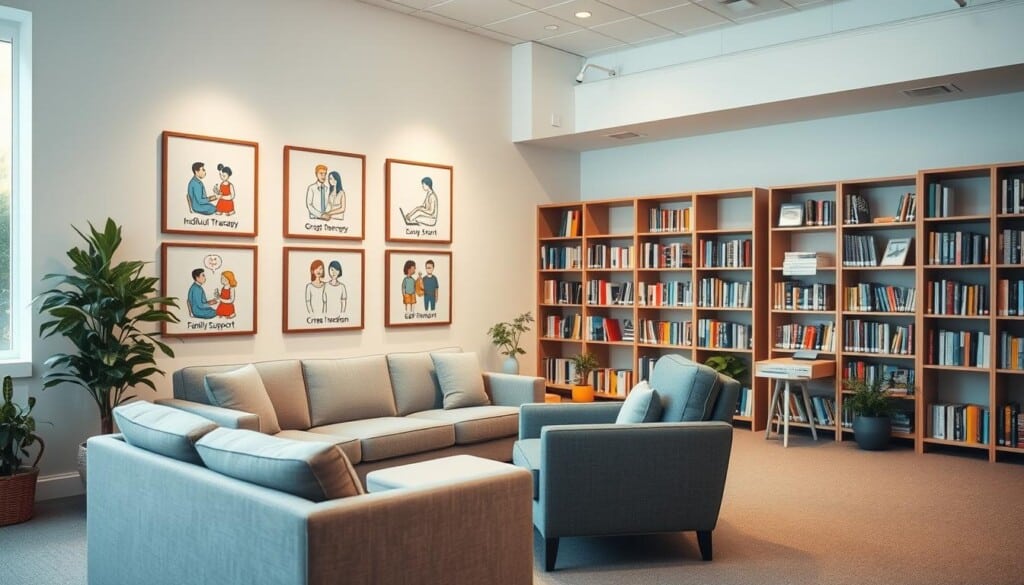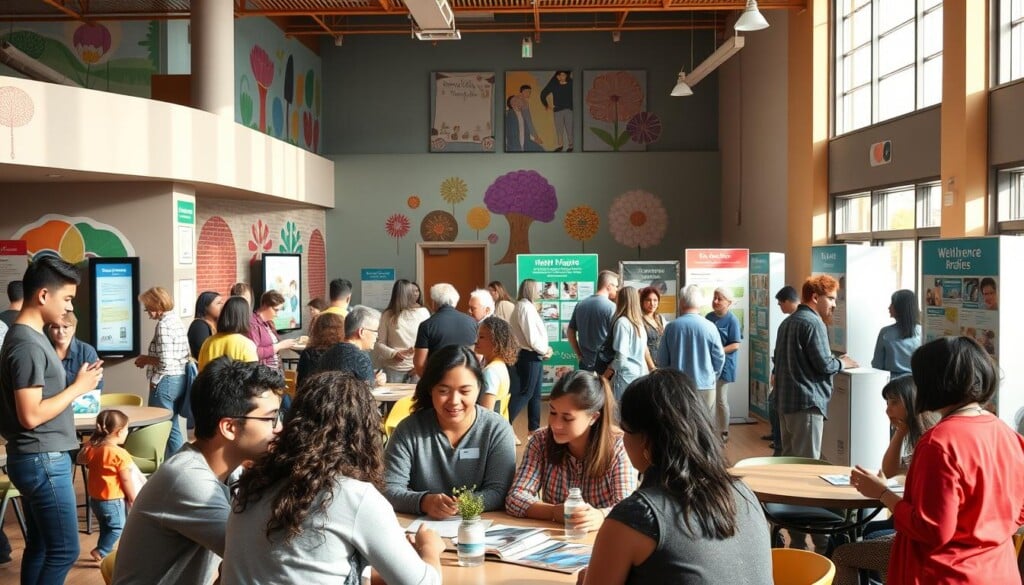Have you ever wondered why some people don’t get the mental health help they need? It’s because mental health & crisis support is complex. In the United States, there are many resources for crisis intervention and emergency mental health services.
This section is your guide to finding these important resources. It shows how vital it is to get help quickly for yourself or someone else in a mental health crisis.
Key Takeaways
- The importance of seeking timely mental health support.
- Various mental health resources are available nationwide.
- Crisis intervention services play a critical role in immediate support.
- Emergency mental health services are essential for crisis situations.
- Understanding how to navigate available resources can lead to better outcomes.
Understanding Mental Health & Crisis Support
Mental health crisis support offers help to those in severe distress. It’s a vital area that ensures people get the right help fast. Without quick help, mental health can get much worse.
What is Mental Health Crisis Support?
This support includes help from trained professionals for those in crisis. They assess and manage immediate needs. This can prevent harm and help stabilize the person.
The Importance of Timely Assistance
Getting help quickly is key in mental health crises. Fast action can stop things from getting worse. It helps people regain control and stability in their lives.
Signs of a Mental Health Crisis
Knowing the signs of a crisis is important for quick help. Look for changes in behavior, emotional distress, and suicidal thoughts. Other signs include withdrawal, increased substance use, and irrational behavior. Spotting these signs helps get the right help.
Finding Local Mental Health Services
Finding the right local mental health services can really help. LocalZ makes it easier to find the support you need. It helps you find services that match your needs and location.
How to Use LocalZ for Mental Health Resources
To find mental health resources on LocalZ, start by typing in what you need. Use keywords like “mental health services” or “counseling.” The site has filters to narrow down your search. You can look for specific types of therapy, support groups, or crisis hotlines.
Searching for Help in Your Community
Getting involved in your community is key to mental health support. LocalZ lets you search for services in your area. Knowing about local services helps build a support network. It makes it easier to get help when you need it.
Types of Mental Health Support Services
It’s important to know about different mental health support services. These resources help a lot and guide people towards recovery. We’ll look at therapy options, crisis hotlines, and community support groups.
Therapy and Counseling Options
There are many therapy types to help with mental health issues. You might find cognitive-behavioral therapy, family therapy, or mindfulness-based therapy. Mental health experts help people overcome their challenges and grow.
Crisis Hotlines and Immediate Support
Crisis hotlines are key for immediate help when you’re feeling overwhelmed. The 988 Suicide & Crisis Lifeline is available 24/7. They offer confidential support during tough times. These hotlines connect you with counselors who provide help when you need it.
Community Support Groups
Community support groups help people who face similar issues. They offer a place to share experiences and find understanding. Being part of these groups can help you cope better and connect with others who get it.
For finding local support groups, check out the LocalZ directory. It’s a great resource to find groups near you.

Legal Rights & Protections for Mental Health
Knowing your legal rights in mental health is key. The Americans with Disabilities Act (ADA) helps ensure you get the services and support you need. This knowledge helps you handle mental health crises with confidence.
Understanding the Americans with Disabilities Act
The ADA is a big help for people with disabilities, including mental health issues. It says you can get reasonable changes in places like work, school, and public areas. Knowing these rights can make it easier to get the care and support you need.
Your Rights During a Mental Health Crisis
In a mental health crisis, you have rights that protect your dignity and help you get the right treatment. These rights include getting care in a supportive place and avoiding unfair treatment. Knowing and using these rights helps you speak up for yourself when you need to.
The Role of Local Organizations in Mental Health
Local organizations are key in boosting mental health support in communities. They make sure people have access to the help they need. They also help create a culture of understanding and empathy.
Through outreach programs, they encourage people to seek help without fear. This is important because it helps break down the stigma around mental health issues.
Community Affiliates You Can Trust
Trustworthy community affiliates connect people in need with available support. They share important information and help coordinate services. This creates networks that make it easier for people to find help.
By working with local mental health organizations, they make sure resources fit the community’s needs. This ensures that help is both accessible and relevant.
Collaborating with Local Mental Health Facilities
Working together with mental health facilities is vital for complete care. These partnerships help local organizations reach more people and improve how they serve. When community groups and mental health facilities team up, they offer a more complete care plan.
This leads to better results for those dealing with mental health issues. Thanks to these partnerships, more resources are available. This builds a stronger support system for everyone in the community.
How LocalZ Connects Businesses and Communities
LocalZ is key in linking businesses and communities. It boosts cooperation, mainly by backing local mental health efforts. This way, LocalZ improves the mental health scene by connecting services with those who need them.
Supporting Local Mental Health Initiatives
LocalZ puts 50% of its yearly fees into community groups. This move brings local businesses and mental health efforts closer together. It also encourages businesses to support these causes, helping fund vital services and building a strong community spirit.
The Impact of Local Z’s Business Model
LocalZ’s model empowers businesses to get involved in their communities. It supports local mental health initiatives with financial help. As LocalZ grows, it will keep boosting community care, making a big difference.

Tips for Supporting Someone in Crisis
Supporting someone in crisis needs a thoughtful approach. It’s about understanding and guiding them. Using empathy helps build a connection and encourages open talk. Knowing how to interact can greatly help them seek professional help when needed.
Active Listening and Empathy Techniques
Active listening is key to making someone in crisis feel heard and valued. Pay attention to what they say, keep eye contact, and show you care with gestures. Empathy means reflecting their words, acknowledging their feelings, and reassuring them without judging.
Creating a safe space lets them share their feelings openly. This is important for healing.
Encouraging Professional Help
It’s important to support them emotionally and help them seek professional help. Tell them seeking help shows strength, not weakness. Share local resources like counseling, therapy, or crisis hotlines.
Highlighting the benefits of professional help can motivate them. It can lead to recovery and better mental health.
Mental Health Resources for Families
Families are key in supporting mental health, more so during tough times. Access to mental health resources can help families get through crises. Caregiver support is vital for understanding and improving mental health. It’s also important to manage family dynamics during a crisis to build resilience.
Resources for Parents and Caregivers
Parents and caregivers face unique challenges. Local groups offer workshops on communication and stress management. These skills are essential for a stable home environment.
Using mental health resources, like counseling, strengthens family bonds. It also helps caregivers support their loved ones better during hard times.
Understanding Family Dynamics in a Crisis
In a mental health crisis, family dynamics can change. This affects relationships and overall well-being. It’s important to understand these shifts to create a supportive environment.
Resources that improve communication and conflict resolution are key. They help families adapt to new challenges. This shows the value of flexibility and unity in facing obstacles.
Educational Institutions and Mental Health
Mental health in schools is now a big topic. Schools are key in helping students with mental health issues. They offer special resources to support students’ well-being.
School Resources for Students in Crisis
Schools have programs to help students in crisis. They have trained counselors, peer groups, and mental health days. These help students feel safe and supported.
The Role of Teachers and Counselors
Teachers and counselors are vital in schools. They help spot students in trouble and offer support. By talking openly about mental health, they help students feel comfortable seeking help.

Utilizing Technology for Mental Health Support
Technology is changing mental health care in big ways. Now, people can find help and support online. This makes it easier for those in need to get help fast.
Apps and Online Platforms for Crisis Support
Crisis support apps are a big help in mental health. They connect users with experts who can help in real time. These apps offer chat support, coping strategies, and forums.
They let people get help quietly and quickly. This shows how important it is to have quick access to help.
Telehealth Benefits for Mental Health
Telehealth is changing how we get mental health care. It lets patients talk to doctors online from home. This makes it easier to get help without worrying about getting there.
It also helps people in far-off places get the help they need. This is a big plus for those who can’t easily see a doctor in person.
Events and Workshops for Mental Wellness
Events focused on mental wellness are key in raising awareness and providing helpful resources. They bring people together to share experiences and strategies for good mental health. These gatherings offer safe spaces for talking and learning, building a sense of community and support.
Local events also help people grow by teaching new skills and solving problems. This personal growth is important for everyone’s well-being.
Local Events Promoting Mental Health Awareness
Many groups organize mental wellness events to teach the community about mental health issues and solutions. These events feature guest speakers, interactive talks, and resource fairs. They help people find local services and supports.
By joining these events, people can start open conversations. This helps reduce the stigma around mental health. It also encourages people to focus on their well-being.
Workshops for Skill Development and Support
Workshops on mental health help people develop skills to manage stress, anxiety, and other challenges. They cover topics like mindfulness, coping strategies, and how to communicate better. These workshops give people tools to improve their resilience and overall wellness.
How You Can Get Involved in Your Community
Getting involved in mental health in your community is key. It helps build stronger support systems. By volunteering, you can make a real difference and meet others who care about mental health.
Volunteering with Local Mental Health Organizations
Local mental health groups have many volunteer spots. You can help in many ways, like supporting outreach programs or helping during crises. This helps build stronger community bonds.
Fundraising Initiatives through LocalZ
LocalZ helps with fundraising for mental health in local areas. By joining these efforts, you support vital programs and encourage more people to care about mental health. Together, we can make our communities healthier and prioritize mental well-being.

